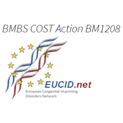EU-Funded Project

Abbreviation:
EUCID
Title:
European Network for Human Congenital Imprinting Disorders.
In short:
Europe-wide initiative to standardize diagnostic and clinical management of human congenital imprinting disorders.
Tags:
Diagnostics, Project Management


Project Details
Funding scheme:
European Cooperation in the field of Scientific and Technical Research – COST Action
Time frame:
14 May 2013 – 13 May 2015
Weblink:
Description:
Imprinting disorders (IDs) are a group of rare congenital diseases affecting growth, development, and metabolism with a lifelong impact on patients´ quality of life. Despite their common underlying (epi)genetic etiologies, IDs are usually studied separately by small groups working in isolation, and the basic pathogenesis and long-term clinical consequences of IDs remain largely unknown. Efforts to elucidate the etiology of IDs are currently fragmented across Europe and standardization of diagnostic and clinical management is lacking. This COST Action, for the first time, drew together researchers of all eight known human IDs in an interdisciplinary pan-European Network for Human Congenital IDs, working to advance understanding of the pathophysiology with the major aim of translating this knowledge to improvement of diagnostic and clinical management for the benefit of the patients and their families. The COST Action harmonized a common ID classification system, developed guidelines for treatment through consensus, created standard operation procedures (SOPs) for diagnosis based on best current practice, coordinated databases held in different countries to make them compatible and useful as a springboard for collective research initiatives, identified new imprinting disorders through collaborative effort, educated researchers and stimulated translational exchange. GenomeScan was part of consortium meetings and assisted in the writing of grant proposals, publications, and guidelines.
Output:
Paternally inherited IGF2 mutation and growth restriction. Begemann M, et al. New England Journal of Medicine 373.4 (2015): 349-356. doi: 10.1056/NEJMoa1415227
Acknowledgements:
Supported by the European Union (COST Action BM1208).

